For the 2025 school year, there is 1 public preschool serving 405 students in Petersburg City School District.
Public Preschools in Petersburg City School District have a diversity score of 0.25, which is less than the Virginia public preschool average of 0.72.
Minority enrollment is 96% of the student body (majority Black), which is more than the Virginia public preschool average of 56% (majority Hispanic and Black).
Overview
This School District
This State (VA)
# Schools
7 Schools
1,059 Schools
# Students
4,464 Students
522,218 Students
# Teachers
307 Teachers
37,218 Teachers
Student : Teacher Ratio
15:1
15:1
District Rank
Petersburg City School District, which is ranked within the bottom 50% of all 135 school districts in Virginia (based off of combined math and reading proficiency testing data) for the 2020-2021 school year.
The school district's graduation rate of 80% has increased from 71% over five school years.
Overall District Rank
#134 out of 135 school districts
(Bottom 50%)
(Bottom 50%)
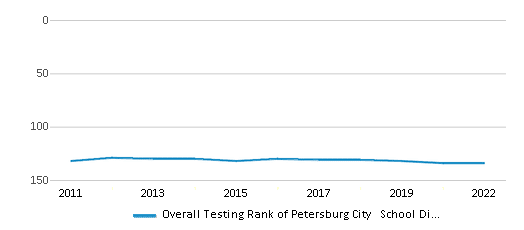
Math Test Scores (% Proficient)
(20-21)26%
54%
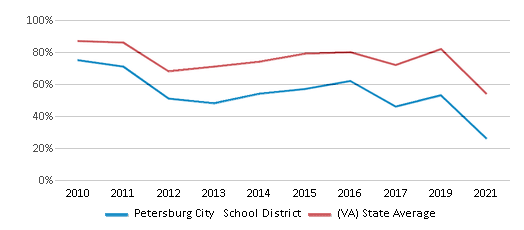
Reading/Language Arts Test Scores (% Proficient)
(20-21)44%
69%
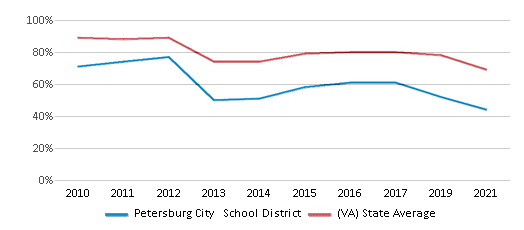
Science Test Scores (% Proficient)
(20-21)25%
59%
Graduation Rate
80%
89%
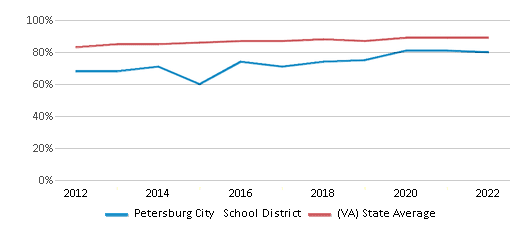
Students by Ethnicity:
Diversity Score
0.29
0.72
# American Indian Students
10 Students
1,435 Students
% American Indian Students
n/a
n/a
# Asian Students
24 Students
42,355 Students
% Asian Students
1%
8%
# Hispanic Students
460 Students
104,836 Students
% Hispanic Students
10%
20%
# Black Students
3,733 Students
103,630 Students
% Black Students
84%
20%
# White Students
175 Students
231,144 Students
% White Students
4%
44%
# Hawaiian Students
10 Students
693 Students
% Hawaiian Students
n/a
n/a
# Two or more races Students
52 Students
38,125 Students
% of Two or more races Students
1%
8%
Students by Grade:
# Students in PK Grade:
405
34,291
# Students in K Grade:
331
76,338
# Students in 1st Grade:
347
80,198
# Students in 2nd Grade:
343
82,775
# Students in 3rd Grade:
338
74,941
# Students in 4th Grade:
325
76,158
# Students in 5th Grade:
303
74,304
# Students in 6th Grade:
277
13,434
# Students in 7th Grade:
319
1,615
# Students in 8th Grade:
305
653
# Students in 9th Grade:
358
1,849
# Students in 10th Grade:
305
1,917
# Students in 11th Grade:
293
1,904
# Students in 12th Grade:
215
1,841
# Ungraded Students:
-
-
District Revenue and Spending
The revenue/student of $14,302 in this school district is less than the state median of $15,502. The school district revenue/student has declined by 9% over four school years.
The school district's spending/student of $13,425 is less than the state median of $15,257. The school district spending/student has declined by 9% over four school years.
Total Revenue
$64 MM
$19,496 MM
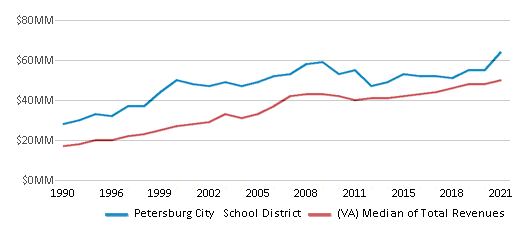
Spending
$60 MM
$19,187 MM
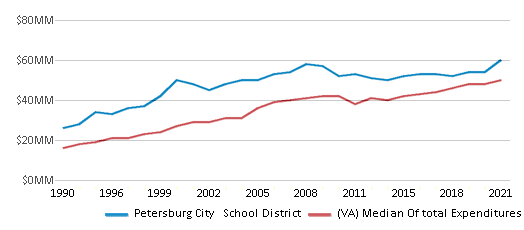
Revenue / Student
$14,302
$15,502
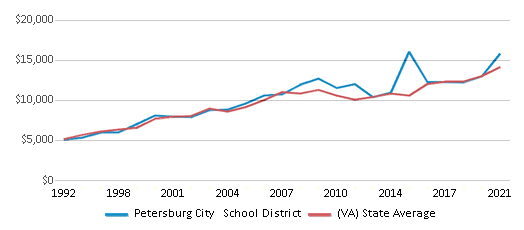
Spending / Student
$13,425
$15,257
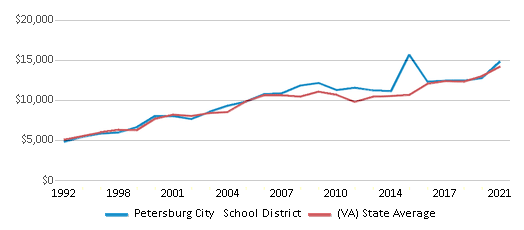
Best Petersburg City School District Public Preschools (2025)
School
(Math and Reading Proficiency)
(Math and Reading Proficiency)
Location
Grades
Students
Rank: n/an/a
1100 Patterson Street
Petersburg, VA 23803
(804) 862-7010
Petersburg, VA 23803
(804) 862-7010
Grades: PK
| 405 students
Recent Articles

Year-Round Or Traditional Schedule?
Which is more appropriate for your child? A year-round attendance schedule or traditional schedule? We look at the pros and cons.

Why You Should Encourage Your Child to Join a Sports Team
Participating in team sports has a great many benefits for children, there is no doubt. In this article you will learn what those benefits are.

White Students are Now the Minority in U.S. Public Schools
Increasing birth rates among immigrant families from Asia and Central and South America, combined with lower birth rates among white families, means that for the first time in history, public school students in the United States are majority-minority. This shift in demographics poses difficulties for schools as they work to accommodate children of varying language abilities and socio-economic backgrounds.





